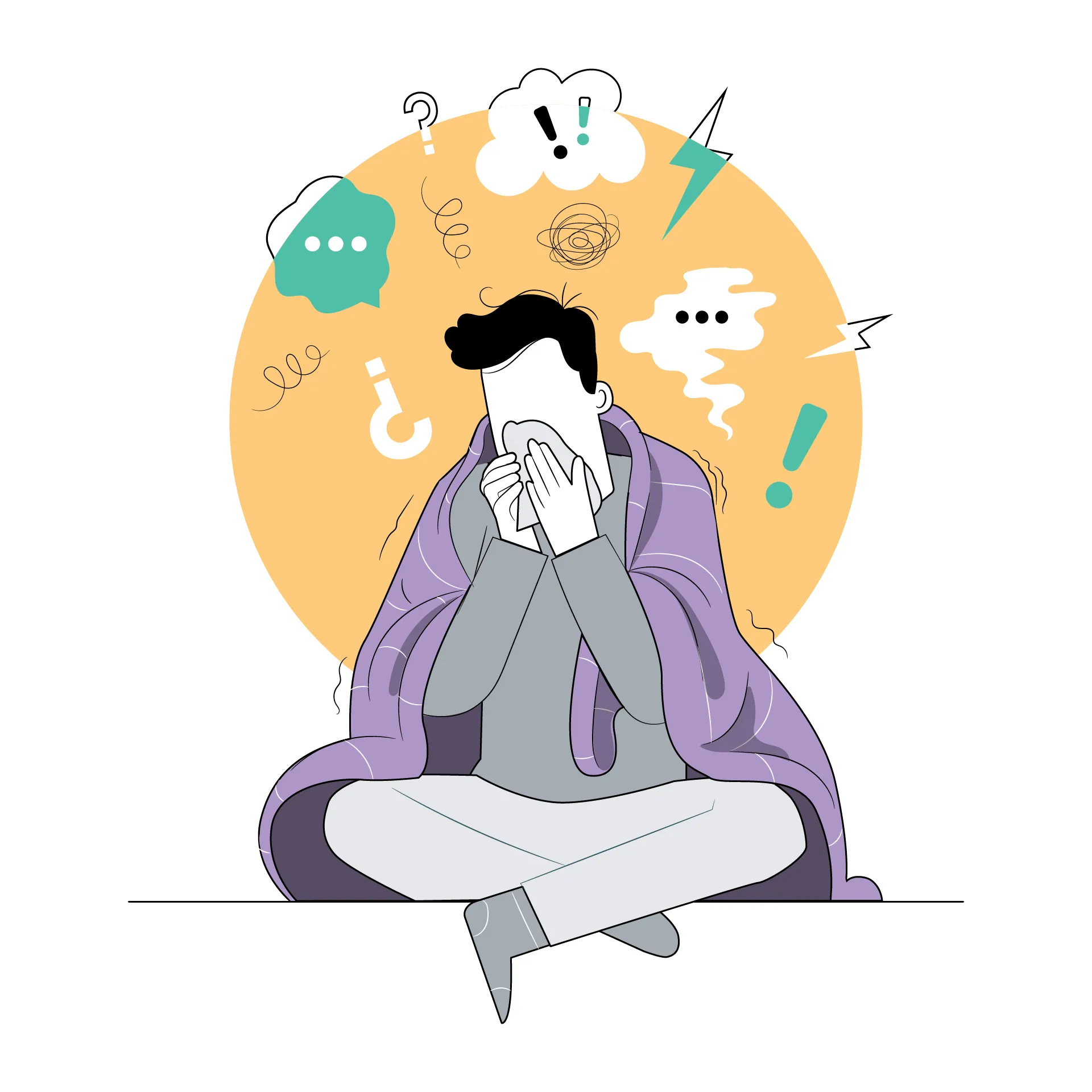Psychiatrist | 7 min read
Illness Anxiety Disorder: Causes, Symptoms and Diagnosis
Medically reviewed by
Table of Content
Synopsis
Excessive preoccupation involved in illness anxiety disorder might come across as overwhelming. Chronic mental illness can be curbed with a prescribed prognosis as we try to delve deeper into the illness anxiety causes.
Key Takeaways
- What causes magnified perceptions regarding one’s health? Engage in discussions regarding the illness anxiety causes
- Chalk out the outline of illness anxiety symptoms with the described DSM-V criteria
- The cure to an illness – the way to illness anxiety treatment
With its alarming prevalence, mental disorders have been covering most of the world's population. The clinically significant disturbances which hijack your day-to-day chores and routine have been grappling with the general population; 21% of the entire U. S. A. adult population has experienced various mental illnesses [1], and over 56 million Indians [2] suffer from depression alone. However, it is sure that the light at the end of the tunnel is getting closer – with open conversations and prominent interventions. With its growing waves, mental illness is no longer a taboo topic. The vital configuration and the much-needed how-to's are seeing the light of the day. The parallel existence of emerging psychoeducation has been a relief and gives hope to the patients who are coming out to be healthy in every way possible. Read on to illness anxiety disorder to know more about it.
What is Illness Anxiety Disorder?
The World Health Organization described mental health conditions as "distress or impairment in important areas of functioning." Access to the abundant psychology literature through the DSM, ICD, APA, etc., has been overtly helpful in bringing the spotlight to the nuances of mental illnesses and delineating the symptoms. For example, health anxiety stemming from an illness anxiety disorder is distinguished as a somatic symptom and related disorder by the guidelines of DSM V.
Somatic symptoms and related disorders are characterized by –
- Excessive thoughts, feelings, and/ or behaviors related to somatic symptoms or associated health concerns
- Somatic symptoms or health concerns manifested as disproportionate and persistent thoughts regarding the severity of the sign.
- Loss of energy and time due to excessive preoccupation with health symptoms or concerns
- The symptoms or associated health concerns should be persistent for at least a total of 6 months.
- The symptom(s) must be severe enough to disrupt the daily flow of life.
The somatic symptom and related disorder appear in mild, moderate, and severe intensity.

Included under this category in the DSM V, illness anxiety disorder patients experience body vigilance. Previously named Hypochondria, the term etymologically meant an illness without any specific ontology. [3]
Illness anxiety disorder, previously known as Hypochondriasis under the category of somatoform disorders, fills up the affected individual with vicious anxiety about their health. The symptoms may not always show themselves physically. However, associated symptoms, such as fastened heartbeat, dizziness, stomach ache, muscle tension, tingling sensation across the body, jittering, etc., may be induced due to the reeling anxiety. The health anxiety caused by the illness anxiety disorder may also worry the patient constantly concerning their current health status.
Often, while being affected by an illness anxiety disorder, the constant fear and worry trigger further somatic symptoms, which perpetuates the health anxiety.
Additional read: How to manage AnxietyThe onset of this illness takes place mostly during early adulthood. However, illness anxiety disorder is prevalent irrespective of gender and age.
Illness Anxiety Disorder Causes
Let us delve into the illness anxiety causes to grasp an understanding of this chronic mental illness.
There are high chances of illness anxiety disorder taking place if an individual has a family history of –
- Extreme stress
- Anxiety disorders
- A serious illness that has occurred in childhood of the affected person
- A parent with severe disease (occurred in childhood or at any other time of their life)
- Depression
- Trauma, abuse, emotionally draining, abusive experiences
- Childhood neglect
Due to the above-mentioned illness anxiety causes, the patient feels the fear way too intensely. Thus even without an actual medical condition, the fear of becoming ill stays persistent. On the contrary, the fear follows up with real somatic symptoms and worsens the disease.
Illness Anxiety Disorder Symptoms
The illness of anxiety disorder may categorize its patients by varying the adaptability of behavior:
- An individual may visit their doctor too frequently and perform excessively health-oriented behavior. This type of patient is the care-seeking type.
- An individual who avoids every doctor appointment and ignores coming across any health-associated results. These patients with illness anxiety disorder are regarded as the care-avoidant type.
The patient not only gets glued to their health but is affected by their surrounding – be it their family member or something in the news that is health-related. Illness and anxiety symptoms may hinder lifestyle practices and limit well-being due to the patient's erroneous beliefs. The patient may start doing their research associated with health and self-diagnose, guided by their health anxiety. 
Here are some distinct symptoms of this chronic mental illness that can be summarised as follows –
- Exaggerating any minor symptoms and the intensity
- Ceaseless anxiety about one's health
- Avoiding public places because of the fear of getting contaminated with an illness
- Worried about normal bodily functions, such as bloating, sweating, etc.
- Repeatedly worried about heartbeat, body temperature, blood pressure, etc.
- Constantly asking the people around about their health
- Oversharing about your health with anyone at any time
All the illness anxiety symptoms must, at least, last for a minimum of 6 months to be considered diagnosable.
Illness Anxiety Disorder Diagnosis
If illness anxiety symptoms ring a bell, the next best step is to get clinically tested. The diagnosis of illness anxiety disorder involves a physical exam and other tests, which may be due to specific individual needs.
- The diagnosis may take place with a psychological evaluation where the psychiatrist may pin up your case history
- The psychiatrist will discuss your discomfort and the severity of the condition
- A self-assessment questionnaire is to be filled out for the further conclusion
- The psychiatrist may look for a history of other illnesses or any drug, alcohol, or substance abuse
- The patient's symptoms should be cross-checked with other similar mental disorders, like generalized anxiety disorder
Illness Anxiety Disorder Treatment
Illness anxiety disorder can be treated and managed effectively with the proper scientific guidance and supervised therapy. It involves psychotherapy, the use of antidepressants, and relaxation techniques, among others.
The patient's prognosis may depend on the intensity and severity of the symptoms. Any other comorbidity is considered before proceeding with a patient's treatment plan.
The illness anxiety treatment plan looks to minimize the symptoms at first. In this illness, the doctor-patient rapport is of utmost importance as the debilitating health anxiety needs to be curbed by forming a base of mutual trust. The patient gets to experience the progress slowly yet effectively.
- Psychotherapy is considered the most effective therapy for illness anxiety disorder. However, cognitive behavioral therapy works best for the patient's erroneous beliefs and maladaptive behavior and modifies them into healthy and adaptive patterns.
- Psychoeducation as an illness anxiety treatment addresses the patient's misinformation and fills in the gap between reality and their grappling fears related to their perceived health risk concerns. The education revolves around normal bodily and somatic sensations and their readings with their day-to-day variations. Psychoeducation may also prevent the patient from spiraling if provided in the earlier stages.
- Pharmacological remedies, such as Serotonin Reuptake Inhibitors, known as SSRIs, are the primary antidepressants used for illness and anxiety treatment. Serotonin Norepinephrine Reuptake Inhibitors, or SNRIs, have been proven effective for illness anxiety disorder. In addition, the antidepressant drug Fluoxetine is also used as a medication for this illness.
- Mindfulness techniques, community support groups, and desensitization are also tremendously effective ways to fight the patient's fears. The health anxiety and the body's vigilance may be lowered by regular practices of these illness anxiety treatments.
- If the patient is having their surroundings affected, be it work, school, or even at home, there is counseling help available; it is provided to both the patients and the affected individuals.
The above treatment plans for illness anxiety disorder require regular maintenance for at least 6 to 12 months. The given options of illness anxiety treatment may be mixed according to the patient’s needs and severity. Get an online doctor consultation from Bajaj Finserv Health and get your perfect treatment plan and lead an anxiety-free life!
References
- https://www.nami.org/mhstats
- https://thelogicalindian.com/mentalhealth/mental-health-indians-30811
- https://www.theravive.com/therapedia/illness-anxiety-disorder-dsm--5-300.7-(f45.21)
Disclaimer
Please note that this article is solely meant for informational purposes and Bajaj Finserv Health Limited (“BFHL”) does not shoulder any responsibility of the views/advice/information expressed/given by the writer/reviewer/originator. This article should not be considered as a substitute for any medical advice, diagnosis or treatment. Always consult with your trusted physician/qualified healthcare professional to evaluate your medical condition. The above article has been reviewed by a qualified doctor and BFHL is not responsible for any damages for any information or services provided by any third party.





